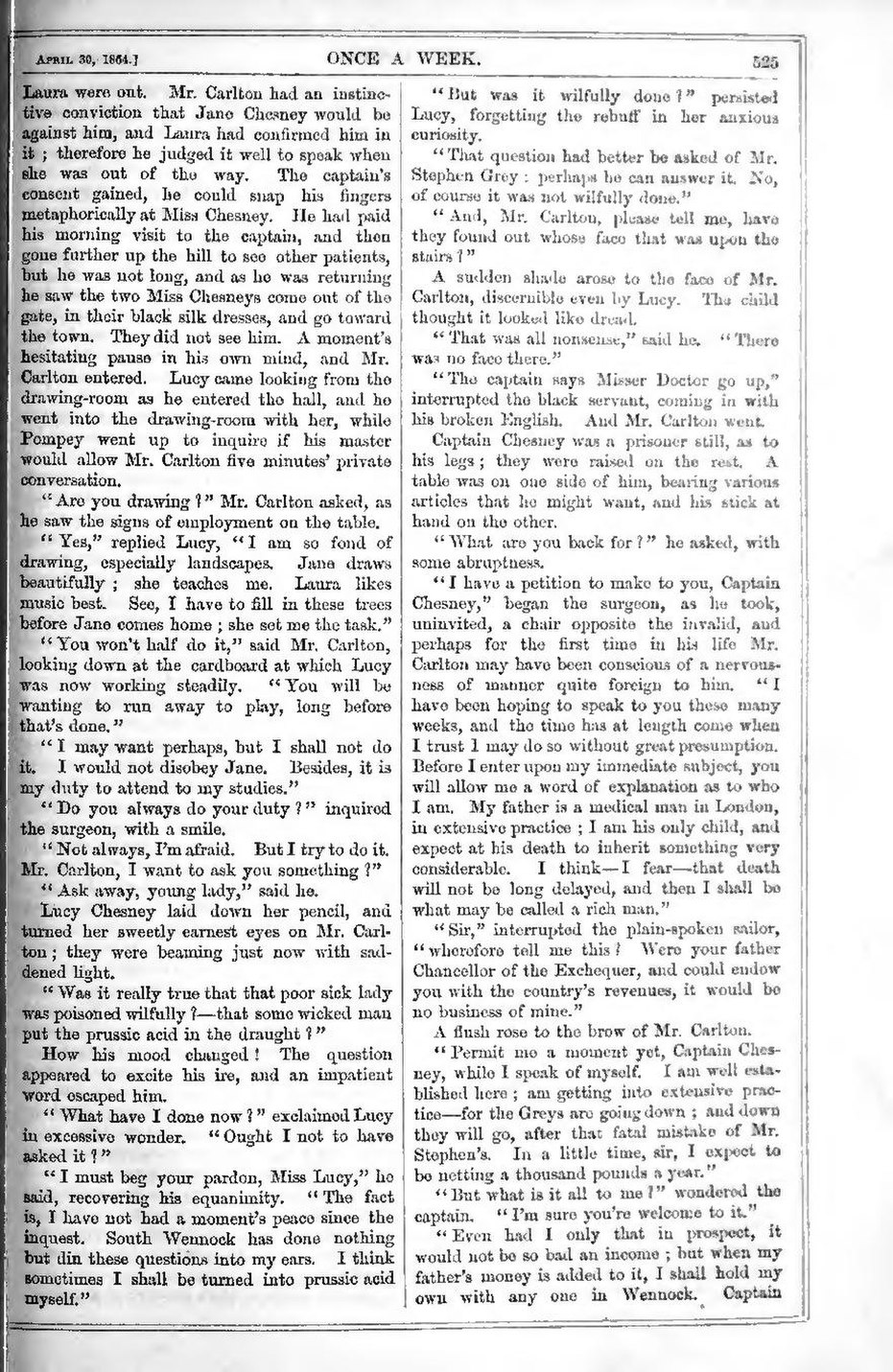Laura were out. Mr. Carlton had an instinctive conviction that Jane Chesney would be against him, and Laura had confirmed him in it; therefore he judged it well to speak when she was out of the way. The captain’s consent gained, he could snap his fingers metaphorically at Miss Chesney. He had paid his morning visit to the captain, and then gone further up the hill to see other patients, but he was not long, and as he was returning he saw the two Miss Chesneys come out of the gate, in their black silk dresses, and go toward the town. They did not see him. A moment’s hesitating pause in his own mind, and Mr. Carlton entered. Lucy came looking from the drawing-room as he entered the hall, and he went into the drawing-room with her, while Pompey went up to inquire if his master would allow Mr. Carlton five minutes’ private conversation.
“Are you drawing?” Mr. Carlton asked, as he saw the signs of employment on the table.
“Yes,” replied Lucy, “I am so fond of drawing, especially landscapes. Jane draws beautifully; she teaches me. Laura likes music best. See, I have to fill in these trees before Jane comes home; she set me the task.”
“You won’t half do it,” said Mr. Carlton, looking down at the cardboard at which Lucy was now working steadily. “You will be wanting to run away to play, long before that’s done.”
“I may want perhaps, but I shall not do it. I would not disobey Jane. Besides, it is my duty to attend to my studies.”
“Do you always do your duty?” inquired the surgeon, with a smile.
“Not always, I’m afraid. But I try to do it. Mr. Carlton, I want to ask you something?”
“Ask away, young lady,” said he.
Lucy Chesney laid down her pencil, and turned her sweetly earnest eyes on Mr. Carlton; they were beaming just now with saddened light.
“Was it really true that that poor sick lady was poisoned wilfully?—that some wicked man put the prussic acid in the draught?”
How his mood changed! The question appeared to excite his ire, and an impatient word escaped him.
“What have I done now?” exclaimed Lucy in excessive wonder. “Ought I not to have asked it?”
“I must beg your pardon, Miss Lucy,” he said, recovering his equanimity. “The fact is, I have not had a moment’s peace since the inquest. South Wennock has done nothing but din these questions into my ears. I think sometimes I shall be turned into prussic acid myself.”
“But was it wilfully done?” persisted Lucy, forgetting the rebuff in her anxious curiosity.
“That question had better be asked of Mr. Stephen Grey: perhaps be can answer it. No, of course it was not wilfully done.”
“And, Mr. Carlton, please tell me, have they found out whose face that was upon the stairs?”
A sudden shade arose to the face of Mr. Carlton, discernible even by Lucy. The child thought it looked like dread.
“That was all nonsense,” said he. “There was no face there.”
“The captain says Misser Doctor go up,” interrupted the black servant, coming in with his broken English. And Mr. Carlton went.
Captain Chesney was a prisoner still, as to his legs; they were raised on the rest. A table was on one side of him, bearing various articles that he might want, and his stick at hand on the other.
“What are you back for?” he asked, with some abruptness.
“I have a petition to make to you, Captain Chesney,” began the surgeon, as he took, uninvited, a chair opposite the invalid, and perhaps for the first time in his life Mr. Carlton may have been conscious of a nervousness of manner quite foreign to him. “I have been hoping to speak to you these many weeks, and the time has at length come when I trust I may do so without great presumption. Before I enter upon my immediate subject, you will allow me a word of explanation as to who I am. My father is a medical man in London, in extensive practice; I am his only child, and expect at his death to inherit something very considerable. I think—I fear—that death will not be long delayed, and then I shall be what may be called a rich man.”
“Sir,” interrupted the plain-spoken sailor, “wherefore tell me this? Were your father Chancellor of the Exchequer, and could endow you with the country’s revenues, it would be no business of mine.”
A flush rose to the brow of Mr. Carlton.
“Permit me a moment yet, Captain Chesney, while I speak of myself. I am well established here; am getting into extensive practice—for the Greys are going down; and down they will go, after that fatal mistake of Mr. Stephen’s. In a little time, sir, I expect to be netting a thousand pounds a year.”
“But what is it all to me?” wondered the captain. “I’m sure you’re welcome to it.”
“Even had I only that in prospect, it would not be so bad an income; but when my father’s money is added to it, I shall hold my own with any one in Wennock. Captain